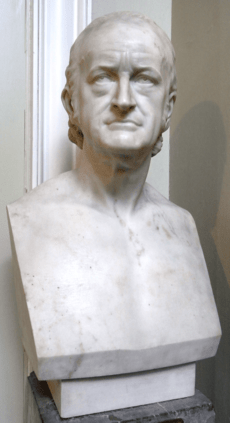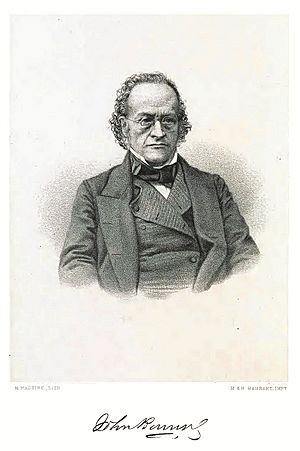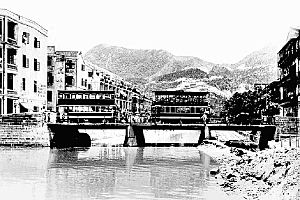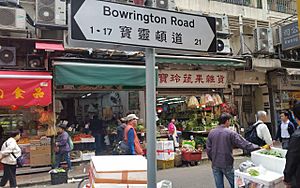John Bowring facts for kids
Quick facts for kids
Sir John Bowring
|
|||||||||||
|---|---|---|---|---|---|---|---|---|---|---|---|
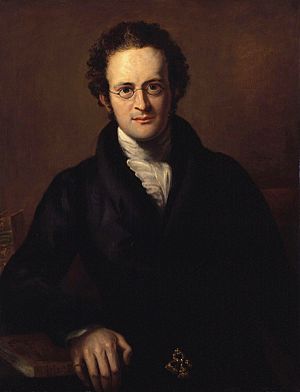
John Bowring in 1826
|
|||||||||||
| 4th Governor of Hong Kong | |||||||||||
| In office 13 April 1854 – 9 September 1859 |
|||||||||||
| Monarch | Victoria | ||||||||||
| Lieutenant Governor | MG William Jervois MG Robert Garrett MG Thomas Ashburnham MG Charles van Straubenzee |
||||||||||
| Preceded by | Sir George Bonham | ||||||||||
| Succeeded by | Hercules Robinson, 1st Baron Rosmead | ||||||||||
| Member of Parliament for Bolton |
|||||||||||
| In office 1841–1849 Serving with Peter Ainsworth (1841–1847), William Bolling (1847–1848) and Stephen Blair (1848–1849)
|
|||||||||||
| Preceded by | Peter Ainsworth William Bolling |
||||||||||
| Succeeded by | Stephen Blair Joshua Walmsley |
||||||||||
| Member of Parliament for Kilmarnock Burghs |
|||||||||||
| In office 1835–1837 |
|||||||||||
| Preceded by | John Dunlop | ||||||||||
| Succeeded by | John Campbell Colquhoun | ||||||||||
| Personal details | |||||||||||
| Born | 17 October 1792 Exeter, England |
||||||||||
| Died | 23 November 1872 (aged 80) Claremont, Devon, England |
||||||||||
| Political party | Radical | ||||||||||
| Spouses |
Maria Lewin
(m. 1816; died 1858)Deborah Castle
(m. 1860) |
||||||||||
| Children |
|
||||||||||
| Profession | Member of Parliament (UK) | ||||||||||
| Chinese name | |||||||||||
| Chinese | 寶寧 | ||||||||||
|
|||||||||||
| Thai name | |||||||||||
| Thai | พระยาสยามมานุกูลกิจ สยามมิตรมหายศ | ||||||||||
| RTGS | Phraya Sayam Manukunkit Sayammit Mahayot | ||||||||||
Sir John Bowring (born October 17, 1792 – died November 23, 1872) was a very talented British man. He was a political economist (someone who studies how governments and money work together), a traveler, a writer, and a polyglot (someone who knows many languages). He became the fourth Governor of Hong Kong.
Queen Victoria sent him to Siam (now Thailand). Later, King Mongkut of Siam made him an ambassador to London. He helped create an important agreement called the "Bowring Treaty" with Siam in 1855. This treaty helped trade between Britain and Siam for 70 years. In 1861, he was sent as a special representative for Britain to the new Kingdom of Italy. Sir John Bowring passed away in Claremont, Devon in 1872.
Contents
Early Life and Learning
John Bowring was born in Exeter, England. His father was a wool merchant. John went to a Unitarian school and started working in his father's business at age 13. He wanted to become a Unitarian minister, which was a religious leader.
He traveled a lot and learned many languages. He even spent six weeks in prison in France in 1822 because people thought he was a spy. He was just carrying papers for a Portuguese official.
In 1818, he started a business selling fish to Spain and France and buying wine. During this time, he became friends with a famous thinker named Jeremy Bentham. John Bowring also loved literature and foreign languages. He wrote 88 hymns (religious songs) between 1823 and 1825.
A Career in Politics and Economics
John Bowring became an editor for a magazine called Westminster Review in 1825. He became well-known for his ideas on how governments and economies should work. He strongly supported free trade, which means countries should trade with each other without many taxes or rules. He also believed in parliamentary reform, which meant changing how the government worked to be fairer. He also supported Catholic emancipation, giving Catholics more rights, and popular education, making education available to everyone.
In 1829, a university in the Netherlands gave him a special degree for his writings on the Dutch language and literature. He was also put in charge of publishing the works of his friend, Jeremy Bentham, after Bentham died in 1832.
Becoming a Member of Parliament
Because of his connections and ideas, the government asked John Bowring to study how different countries managed their money. His work was highly praised.
In 1835, Bowring became a Member of Parliament for Kilmarnock. The next year, he led a government group to France to study trade. After losing his seat in 1837, he continued to investigate economic issues in places like Egypt, Syria, and Italy. He also spoke out for equal rights for women and for ending slavery.
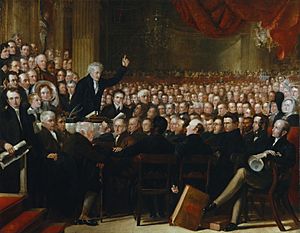
In 1841, he became a Member of Parliament for Bolton. In Parliament, he fought for free trade, changes to the government, and better support for the poor. He also wanted to end the death penalty and harsh punishments in the army.
Business and Currency Reform
John Bowring also invested in the iron industry in South Wales. He became the chairman of the Llynvi Iron Company in 1845. He was known as a fair employer in that area. He also became chairman of the London and Blackwall Railway, which was one of the first steam-powered city railways.
He was a strong supporter of decimal currency, which means using a system based on 10 (like our money today). In 1847, he spoke to the House of Commons about it. This led to the creation of the "florin" coin, which was one-tenth of a pound sterling.
In 1848, his business in South Wales failed, and he lost a lot of money. This led him to accept a new job as a British consul in China.
Work in China and Hong Kong
In 1849, John Bowring was appointed as the British consul in Canton (now Guangzhou), China. He was also in charge of trade there. He found a lot of corruption and was frustrated that Chinese officials would not meet with him.
From 1852 to 1853, he temporarily served as Britain's chief representative and Governor of Hong Kong. He helped set up a system in 1855 to collect customs duties for the Chinese government. This helped stop corruption and modernize China's international trade. He also worked to improve conditions for Chinese workers (coolies) who were traveling overseas.
Governor of Hong Kong
On April 13, 1854, John Bowring became the official Governor of Hong Kong. He was a very busy governor who wanted to make many changes. He allowed Chinese citizens in Hong Kong to serve on juries and become lawyers. He also helped create Hong Kong's first public water supply system.
He developed an area in Wan Chai near Happy Valley, which was named Bowring City (Bowrington). He also made sure that new buildings in the colony were designed more safely.
Bowring noticed that there was a big gap in understanding between the foreign and Chinese communities. He tried to bring in democratic reforms in 1856, suggesting that more people should be able to vote for the Legislative Council. However, this idea was rejected by the Colonial Office in London.
He also worked to improve education. He noticed that much more money was spent on policing than on schools. He quickly brought in school inspectors, teacher training, and opened more schools. The number of students increased greatly.
He faced many challenges and disagreements during his time as governor. In 1857, there was a serious incident where arsenic (a poison) was mixed into the flour of a bakery in Hong Kong. Many people were poisoned, and his wife died from it. This event deeply affected Bowring.
Diplomacy and Later Years
In 1855, Bowring had a very different experience in Siam (Thailand) compared to China. He was welcomed like royalty by King Mongkut. They had friendly discussions and signed the Bowring Treaty on April 17, 1855. Bowring respected King Mongkut, and the King later appointed Bowring as Siam's ambassador to Europe in 1867.
The Arrow Incident and War
In October 1856, a disagreement happened with a Chinese official over a British-flagged ship called the Arrow. Bowring saw this as a chance to demand more access to Canton, which had been promised in an earlier treaty but not given. His strong actions led to the Second Opium War (1856–1860).
During his time, Hong Kong also had its first bilingual (English-Chinese) law.
His time in Hong Kong ended in May 1859. He had lost his wife, and his administration faced many difficulties. After leaving Hong Kong, he wrote a book about his travels in the Philippines.
His last job for the British government was in Italy in 1861, where he reported on trade with the new kingdom. He also served as an ambassador for the Kingdom of Hawaii to European countries, helping them create treaties.
Linguist and Author
John Bowring was an amazing linguist. He claimed he knew 200 languages and could speak 100! He translated folk songs from many European countries. He also wrote his own poems, hymns, and books about politics and economics. Some of his first translations were Specimens of the Russian Poets (1821–1823). He also translated works from Dutch, Spanish, Polish, Serbian, and Hungarian.
Some of his well-known hymns include "God is love: his mercy brightens" and "In the Cross of Christ I glory." These hymns are still sung in many churches today.
Selected Publications
- Specimens of the Russian Poets (1821–1823)
- Batavian Anthology; or, Specimens of the Dutch Poets (1824)
- Ancient Poetry and Romances of Spain (1824)
- Hymns (1825)
- Matins and Vespers with Hymns and Occasional Devotional Pieces (1827)
- Specimens of the Polish Poets (1827)
- Serbian Popular Poetry (1827)
- Poetry of the Magyars (1830)
- Cheskian Anthology (1832)
- Minor Morals for Young People (1834)
- The Decimal System in Numbers, Coins and Accounts (1854)
- The Kingdom and People of Siam (1857)
- A Visit to the Philippine Islands (1859)
Family Life
John Bowring was married twice. His first wife, Maria, died in 1858 from the arsenic poisoning incident in Hong Kong. They had five sons and four daughters.
- His son John Charles loved insects and collected about 230,000 beetle specimens. He gave them to the British Museum.
- His son Edgar Alfred Bowring was also a Member of Parliament for Exeter.
- His son Lewin Bentham Bowring worked in India as a private secretary and later as a commissioner.
- His daughter, Emily, became a Roman Catholic nun. She was the first headmistress of the Italian Convent School (now Sacred Heart Canossian College) in Hong Kong.
In 1860, John Bowring married his second wife, Deborah Castle. They did not have children. Deborah was a strong supporter of women's rights.
John Bowring died on November 23, 1872, at the age of 80.
Awards and Recognition
- Knight Commander of the Order of the Bath (KCB) in 1854.
- Knight Grand Cross of the Royal Order of Kamehameha I from the Kingdom of Hawaii in 1857.
- He was a Fellow of the Royal Society and the Royal Geographical Society.
- He received an honorary title from Siam: Phraya Siamanukulkij Siammitrmahayot.
- He became a member of the American Antiquarian Society in 1834.
Legacy and Impact
John Bowring helped make Samuel Taylor Coleridge's famous poem Kubla Khan more popular.
In South Wales, a part of the Llynfi Valley was called Bowrington because of his iron company. Today, a shopping area in Maesteg is named the Bowrington Arcade.
Bowring Road in Ramsey, Isle of Man was named after him. This was to thank him for supporting voting rights and helping trade with the island.
In Hong Kong, several places are named after him because he was the 4th Governor:
- Bowring Praya West and Bowring Praya Central were two roads built on reclaimed land. They were later renamed.
- Bowrington is an area he developed, which is now home to the Bowrington Market. He built the Bowrington Canal, and the original Bowrington Road (now Canal Road) and Bowrington Bridge crossed it. A street called Bowrington Road still exists today.
- Bowring Street is in the Jordan, Hong Kong district.
He also helped establish the Botanic Gardens in Hong Kong, which is still a beautiful place today.
Two types of lizards, Hemidactylus bowringii and Subdoluseps bowringii, are named in honor of John Bowring or his son John Charles Bowring.
John Bowring also founded the Hastings Unitarian Church in England. The actress Susannah York was his great-great-granddaughter.
Images for kids
See also
 In Spanish: John Bowring para niños
In Spanish: John Bowring para niños
 | William Lucy |
 | Charles Hayes |
 | Cleveland Robinson |


